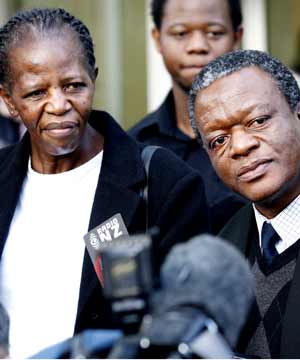The Press
May 24 2008
No treatment for child's HIV
John Hartevelt

PETER MEECHAM/The Press
KNEW OF ILLNESS: George Gwaze and his wife, Sifiso, talk to the media after his acquittal on murder and sexual violation charges in Christchurch on Wednesday. They both knew Charlene Makaza was HIV positive but no treatment for the condition was arranged.
George Gwaze and his wife Sifiso knew their adopted daughter Charlene Makaza was HIV positive but she received no treatment for the disease.
George Gwaze was acquitted of murdering and sexually violating Charlene, 10, on Wednesday by a jury at the High Court in Christchurch. His defence team argued that it was the HIV condition that caused Charlene's death.
Alfred Nyoni, chairman of the South Island Zimbabwean Association and a friend of the family, said everybody knew Charlene had HIV from the day she arrived in New Zealand in 2006.
"They (George and Sifiso Gwaze) knew that she was HIV positive. Her parents both died of Aids so obviously she had Aids as well," he said.
Asked why they did not seek treatment for Charlene's condition, Nyoni said: "I wouldn't know, mate. Aids will eventually kill you, won't it? The fact that she lived all those years anyway you know, because normally kids in Africa they don't last for five years."
Counsel for Gwaze, Jonathan Eaton, this week said Charlene was never tested for HIV until hours before she died in Christchurch Hospital early on January 7, 2007.
He said Charlene had been taken to the doctor once in the time she had been in New Zealand.
Charlene's mother Sifiso Gwaze was not surprised to learn Charlene tested positive.
Eaton said he did not know why Charlene was never treated for HIV.
"It just wasn't part of the trial," he said.
"Perhaps because she had been so unwell for so long they didn't see her illness as that significant and there was nothing really overt in her illness that would have made them particularly concerned."
During the trial, Sifiso Gwaze told the court they knew Charlene had been unwell from an early age. The couple adopted Charlene and her sister Charmaine after their natural parents both died through illnesses believed to be caused by HIV.
Documents from Harare dating from 1999 referred to Charlene being chronically and possibly terminally ill, and she had suffered from several illnesses, including respiratory-tract and ear infections and diarrhoea.
After arriving in New Zealand, Charlene took 20 days off school because of illness. Her school had become concerned about her progress and had contacted the family, Sifiso Gwaze said at trial.
Nyoni said Charlene had sores on her mouth and nose.
"She wasn't well, you could just tell," he said.
"She was a sickling, that's for sure. She was always sick. We used to go to the same church as her and we used to pray for her to get well."
Dr Maud Meates-Dennis told the High Court on May 13 that if doctors had known Charlene was HIV positive she would have been sent to Christchurch Hospital's paediatrics department, where she would have been monitored every three months and treated as needed.
The medical director of Christchurch Hospital's infectious diseases services, Dr Steve Chambers, this week said there were very successful and widely available treatments available for HIV.
He could not say whether Charlene's life could have been saved, but said: "Often, early treatment is extremely successful. I would encourage people who are at risk or know they're infected to get treatment because it's extremely successful."
Simon Harger-Forde, of the New Zealand Aids Foundation, said Charlene's case highlighted the importance of HIV testing, especially for those with significant risk factors such as being from high-risk nations such as Zimbabwe.
Section 152 of the Crimes Act 1961 states a caregiver may be prosecuted for failing to provide the necessities of life, but Canterbury University criminal law lecturer Chris Gallavin said Gwaze was not likely to be prosecuted on that. "This is not minor and she was suffering from a very serious disease and they ought to have done something, but he has been tried for murder so he can't be tried again," Gallavin said.
It was possible that Sifiso Gwaze could be charged but the Crown "probably didn't have it in them".
Charlene's sister, Charmaine, has been in the care of Child Youth and Family, living with extended family members, since January 9, 2007 two days after Charlene's death.
A CYF spokeswoman refused to say whether Charmaine would be sent back to live with the Gwazes.